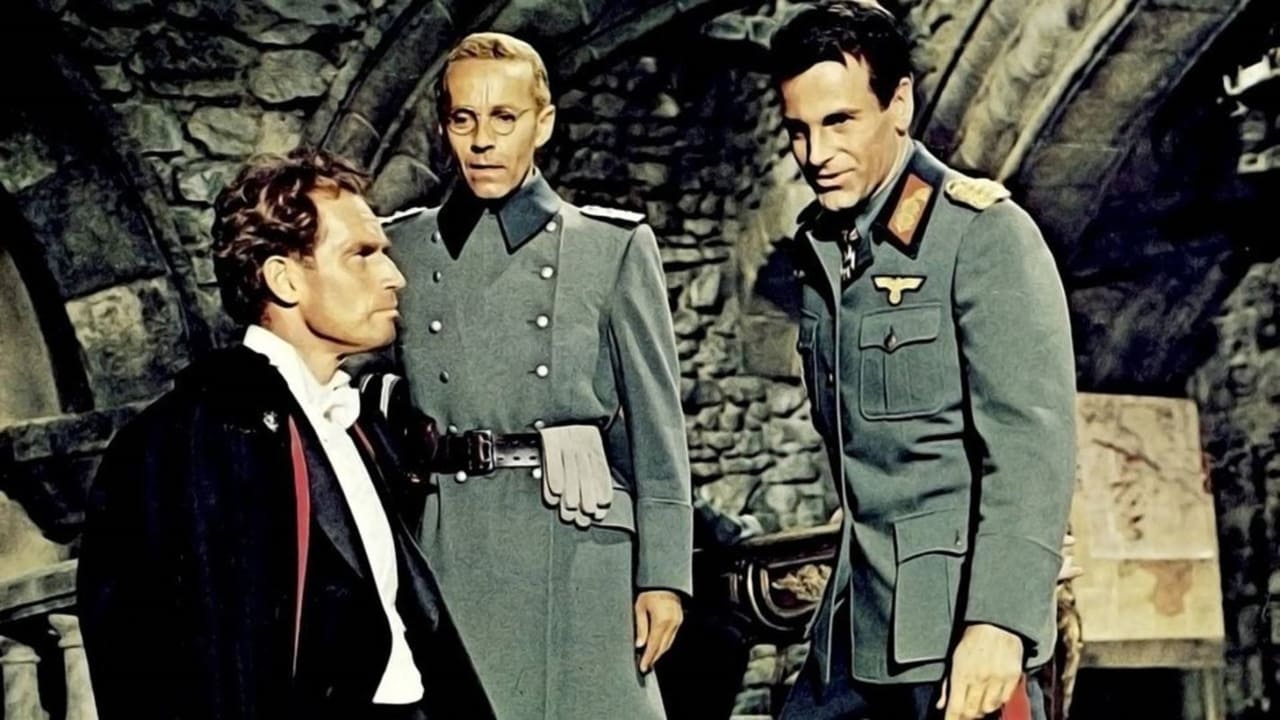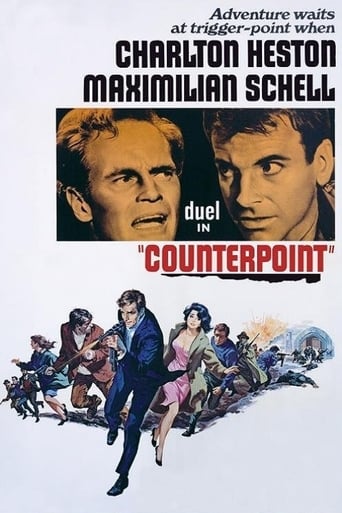

Too many fans seem to be blown away
... View MoreBest movie of this year hands down!
... View MoreThe movie's neither hopeful in contrived ways, nor hopeless in different contrived ways. Somehow it manages to be wonderful
... View MoreThe movie turns out to be a little better than the average. Starting from a romantic formula often seen in the cinema, it ends in the most predictable (and somewhat bland) way.
... View MoreFamous symphony conductor (Charlton Heston) is captured by the Germans in WW2 and is forced to put on private concerts for the Nazi generals . At the beginning the known orchestra conductor entertains the Allied troops until is taken nearly Bastogne , during Ardennes offensive led by General Von Rundstet . The musicians are moved to an impressive castle where is a Nazi army , a Panzer Division commanded by Gen. Schiller (Maximilian Schell) and Col. Arndt (Anton Diffring) . To save their lives , the players (Parley Baer , Bill Erwin , Ed Peck ,Dan Frazer and ¡ Leslie Nielsen¡ along with his wife performed by Kathryn Hays) have to play a private concert . However , the musical conductor doesn't want to follow the Nazi orders . Meanwhile , Lt. Long (Linden Chiles) and Sgt. Calloway (Peter Masterson) who are hidden in orchestra attempt to escape . Good melodrama packs adequate cinematography , nice settings , classic score and wonderful performance . Enjoyable picture in which takes place an exciting battle of wits between two aces of interpretation : Charlton Heston and Maximilian Schell . Acting by two principal actors is first-range , both of whom are magnificent . Extraordinary Maximilian Schell , as usual , and acceptable acting by Charlton Heston as orchestra conductor though he must not change facial expression while conducting . Support cast is frankly good , such as Kathryn Hays , Leslie Nielsen , Linden Chiles , Peter Masterson and a cameo by the same director , Ralph Nelson , as Belgian officer . Special mention for Anton Driffing who worked continuously in motion pictures due to his aristocratic, German face and cool, clipped diction, making him ideal for typecasting in British and later American motion pictures as Nazis and other vile, despicable characters such as : ¨Where eagles dare¨, ¨The Blue Max¨ , The Heroes of Telemark , "The Battle of Sutjeska" , ¨Zeppelin¨ , ¨Victory¨ and many others . Russell Metty cinematography in Techniscope is rousing and colorful . Bronislau Kaper soundtrack is riveting , including classy musical score ; these are the followings pieces heard in the film : 5º symphony of Bethoven , Endless symphony by Schubert , 1º symphony of Brahms , Lake of swans by Tchaikowski and Tanhauser's Wagner . The feature obtained a limited success and had a moderated box-office , it is nowadays better valued . The motion picture was well directed by Ralph Nelson . There were no half measures in this filmmaker. He would make sentimental movies or violent and gore films . Failure alternated with hits through the 1960s, though Nelson's direction was more than successful in ¨Lilies of the field¨ with invaluable help of Sidney Poitier who won an Oscar as an African-American helping a group of German nuns to build a chapel. And of course , his greatest success ¨Soldier Blue¨, including cruel massacres and and blood fountained all over the screen . In the 7os Nelson went on to making strong movies , however, his films themselves were doing less successful at the Box office , numerous of those being barely seen outside US . As a violent Zapata Western titled ¨Wrath of God¨ with Robert Mitchum, as ¨Tick..Tick..Tick¨ in which the racial tensions arise when a black man being elected sheriff , ¨ The Wilby conspiracy¨ about the apartheid and again with Poitier and a Sci-fi movie titled ¨Embryo¨ with Rock Hudson. Rating : Better than average , Charlton Heston fans will enjoy their idol .
... View MoreI know the plot may be a little far-fetched, but this is still a very involving and entertaining film. It takes place near the end of World War II when most of central Europe is secure and USO troupes are busy entertaining the Allied troops. A Philharmonic Orchestra on a USO tour ends up in Belgium and encounters a pocket of Nazi soldiers. Captured, the orchestra is to be exterminated after the General (Maxmillian Schell) wangles a personal concert out of the arrogant conductor (Charlton Heston). The mind games between these two, regarding the staging of a concert is part of the fun. The music is great, adding to the tension and enjoyment of the film. It holds up very well after 40 plus years. It works both as an action film and a character study. Anton Diffring stands out in a very fine cast. Topnotch! BEWARE the DVD: I ordered the DVD from a company I will not name nd it was of very poor quality. The film, which is in color, was dark and black most of the way through and the focus was not sharp. The sound was low-fi, fuzzy and unacceptable to my criteria. We need to wait for Universal to put out a decent print. Don't waste your money on this one!
... View MoreIf you're a World War II movie fan or a woman and a Maximillian Schell fan, or both, this hard to find film has definitely captured Maximillian Schell's charm and appeal. Even though he plays a German General, the "bad guy," his performance makes it very difficult NOT to like him. He is handsome and witty underneath the power of authority that he exudes. His performance is by far the best. A hand would have to be given to given to the young "pre-Naked Gun" Leslie Nielsen also. The movie plot is perhaps a little unrealistic but that's the beauty of film, right? Engaging and somewhat memorable to say the least. Worth a look if you can find it.
... View More.... yeah that`s what I thought , but Heston plays an arrogant , bullying indominatable conducter , so no miscasting there then . Leslie Nielson in a straight role ! , well this was made long before THE NAKED GUN so we can overlook that . If anything COUNTERPOINT is too safely cast , Maximilian Schell and Anton Diffring play German officers , Schell plays an ambigious German who`s not a die hard nazi but is worse in some ways while Diffring plays a streotypical nazi murderer , so no change there then.COUNTERPOINT is a fairly good war drama. The only real bad point is the subplot of a traitor at work within the orchestra , when their identity is revealed it feels very rushed and underdeveloped . Still it`s an okay film to watch if there`s nothing else on , and watch the end titles where Heston puts on his most arrogant expression and turns to his left as the cast credits roll. I can`t help thinking this is done on purpose and brings a wry smile to my face
... View More